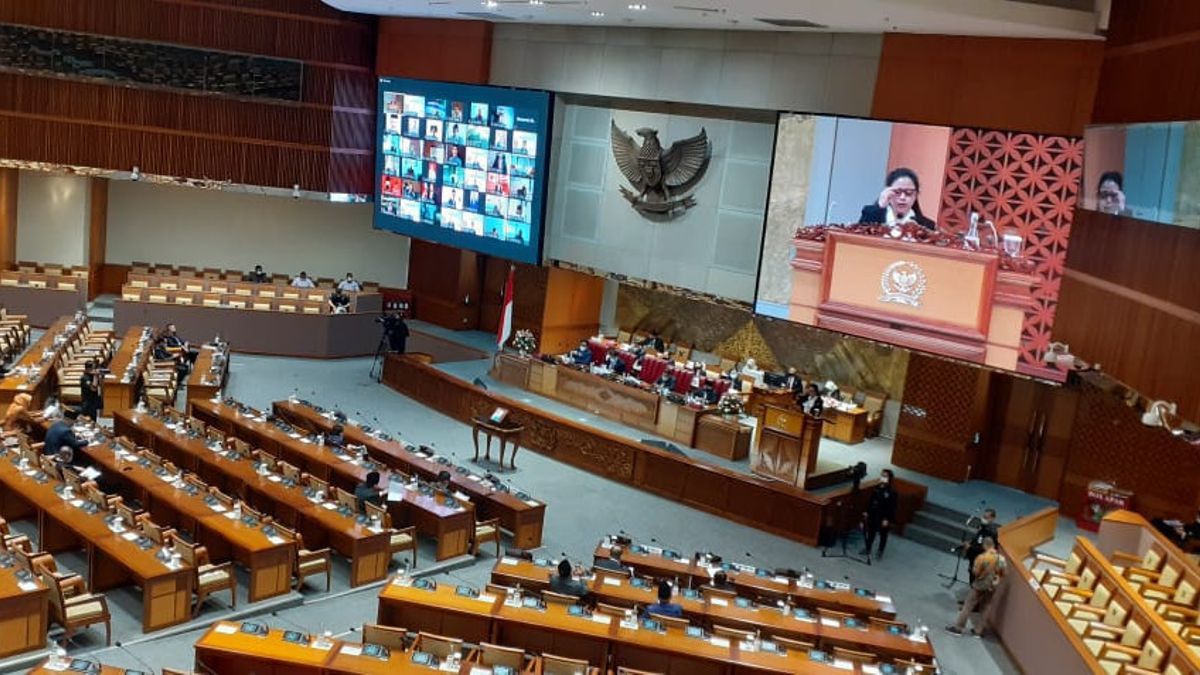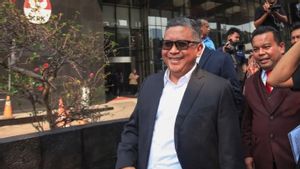JAKARTA - The Prosperous Justice Party (PKS) DPR RI is one of the factions proposing the Draft Law (RUU) on the Prohibition of Alcoholic Drinks (Minol). They insist that the rule is passed immediately. This bill is a controversy. Apart from its controversy, in this bill PKS shows strategic and ideal political practices. When there are many political parties whose policy bases are no more than opportunists, PKS shows consistency, at least with regard to constituents and party ideology.
Since the beginning, PKS was confident in carrying out the Minol Prohibition Bill. They are aware that a number of regions have succeeded in enforcing Regional Regulations (Perda) regarding the prohibition and regulation of alcohol or alcoholic beverages.
"The PERDA [regional regulation] which prohibits and regulates alcoholic beverages The prohibition of alcoholic drinks (Minol) has actually been a long time ago and has been widely implemented in various regions in the archipelago," wrote a statement by the PKS DPR faction via Twitter account @FPKSDPRRI, quoted on Tuesday, November 17.
The PERDA which prohibits and regulates the prohibition of alcoholic drinks (Minol) has actually been long and has been implemented in various regions in the archipelago. #fraksifpksdprri #fractionpksdprri #firkhidmatforrakyat #pksawasikabinet pic.twitter.com/yfcDrooK0z
- PKS faction DPR RI (@FPKSDPRRI) November 16, 2020
Through his Twitter account, PKS explained the regions that have implemented regulations regarding the prohibition of alcohol or alcohol. In that note, it was noted that the regions that had implemented regulations on restrictions on alcohol for the longest time were South Kalimantan Province with Perda No. 7/2008, and Bone Bolango District with Perda No. 10A/2008.
Meanwhile, most recently, the regions that have implemented these rules are Sragen Regency with Regional Regulation Number 3 of 2018 and Morotal Island Regency with Regional Regulation Number 6 of 2018. At least, PKS noted that a total of 13 regions have implemented similar rules.
Building policies from the regionsFor PKS, the party's political steps in pushing for regulations on the prohibition of alcoholic drinks have been strategically initiated from the regions. One area that PKS has succeeded in encouraging to draft a regional regulation on the prohibition of alcoholic beverages is the city of Banjarmasin. Member of the Banjarmasin City DPRD Mathari from the PKS party is the person who became the Chair of the Special Committee (Pansus) who succeeded in revising the Regional Regulation Number 27 of 2011 concerning Supervision and Control of Alcoholic Drinks in 2017.
He hopes that the ratification of this regional regulation can improve supervision and control over the circulation of alcoholic drinks. "We hope the city government can immediately implement new regulations on the circulation of alcoholic drinks in this city, so that everything can be monitored and controlled as expected," Mathari said as quoted by Antara, Wednesday, November 18.
The PKS attitude regarding the prohibition of alcoholic drinks has also been shown since 2016. The 4th meeting of the PKS Syuro Council has produced recommendations, one of which appreciates the formation of a regional regulation that prohibits mineral oil issued by Papua Province.
"We really appreciate these local regulations, including the last regulation on alcohol prohibition issued by Papua province," said Mustafa Kamal, who is the Secretary General (Secretary General) of PKS in his written statement.
Not only guerrilla passing local bylaws in the regions. PKS also consistently maintains that the regulation remains. In Pamekasan, for example. The Regency DPRD was about to revise Perda No. 18/2001 on the Prohibition of Alcoholic Drinks.
The Secretary of the PKS faction of the Pamekasan DPRD, Al Anwari, openly refused to revise the regulation. He argued that Pamekasan Regency is the blood of the Islamic community development movement (Gerbangsalam).
"We the PKS faction will garner support from ulama and community leaders to reject the revision of the regional regulation against alcoholic beverages," said Al Anwari as quoted by Kompas.
Arises sinkingIn general, the discussion of the Minol Bill began when the Supreme Court granted the Islamic Defenders Front (FPI) lawsuit against Presidential Decree (Keppres) Number 3 of 1997 concerning Control of Alcoholic Drinks, on June 18, 2013. The Supreme Court considered the rules signed by President Soeharto on February 12, 1997. contradicts Pancasila and the 1945 Constitution, Law Number 36 of 2009 concerning Health, Law Number 8 of 1999 concerning Consumer Protection, and Law Number 7 of 1996 concerning Food.
The Supreme Court decision has created a vacuum in the legal umbrella for the alcohol trade. Therefore, the DPR proposed a bill prohibiting minol in the 2014-2015 National Legislation Program (Prolegnas).
However, the bill has drawn protests because it is named the Prohibition of Alcoholic Drinks. Once drowned during the 2019 campaign period, now the proposal is back in the 2020 Prolegnas.

[/ read_more]
The proposers hope that the bill on the prohibition of minol, which consists of seven chapters with 24 articles, will quickly be realized. The reason is, the regulation is considered important because there is no law-level regulation regulating alcoholic beverages, including public participation in its control.
"This bill aims to protect the public from negative impacts, create order and peace in society from alcoholic drinkers. This bill is also intended to raise public awareness about the dangers of alcoholic beverages," said a member of the DPR RI Baleg from the United Development Party Faction ( PPP) Illiza Sa'aduddin Jamal quoted in his written statement, Thursday, November 12.
As proposer, Illiza said, the draft law will maintain the plurality of society because there will be exceptions in its implementation. "The prohibition of consuming alcoholic drinks is exempted for limited interests such as customary interests, religious rituals, tourism, pharmacy and places permitted by statutory regulations," he said.
Ideological practiceIf the Minol Prohibition Bill appears to sink, PKS's attitude is always the same. In this perspective, PKS practices the ideal party function, that the party must have an ideology in the formation of a policy.
Not a utopian affair. From a deeper perspective, political parties have the responsibility to fight for the votes of their constituents - who choose based on party attitudes - through upholding party ideology.
In the midst of the high pragmatism of political parties today which often aim to issue regulations, so that they are notoriously preoccupied, PKS's political steps in the Minol Prohibition Bill are important to see.
"That is in accordance with the party's ideology as an Islamic party with the majority of supporters of Islam. PKS certainly has an obligation to publish policies that are in accordance with Islamic values," said Head of the LIPI Political Research Center Firman Noor to VOI, Wednesday, November 18.
Opportunity
Regarding the ideological consistency and political steps of PKS in initiating this policy from the regions, a political observer from Al Azhar University, Ujang Komaruddin said, although it is ideal in practice, this strategy is not always effective. Political escalation at the national level is definitely different from the regional level, especially where the regional head is occupied by PKS cadres.
"Because the regional head could be PKS ... But for the DPR, PKS is still a minority. So it takes a strong effort," he said, "said Ujang.
From another point of view, Firman Noor from LIPI said the PKS political strategy could be an additional strength in the party's struggle at the national level. In the process of forming normal political policies, regional support can be an important argument for why a bill should be passed.
"If then there is an endorsement from the regions, I think it is a synergistic step that can be used by PKS, that this voice is not only voiced at the national level, but also in the regions, so that the step is more legitimated. Because there must be considerations in the formulation of a policy. on the consideration that this is in line with the grass roots of Indonesian society, so it is more argumentative, "Firman Noor.
[/ read_more]
The English, Chinese, Japanese, Arabic, and French versions are automatically generated by the AI. So there may still be inaccuracies in translating, please always see Indonesian as our main language. (system supported by DigitalSiber.id)









